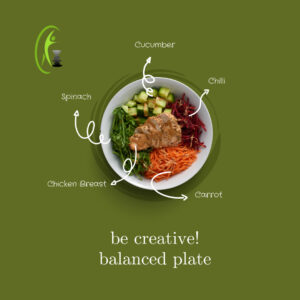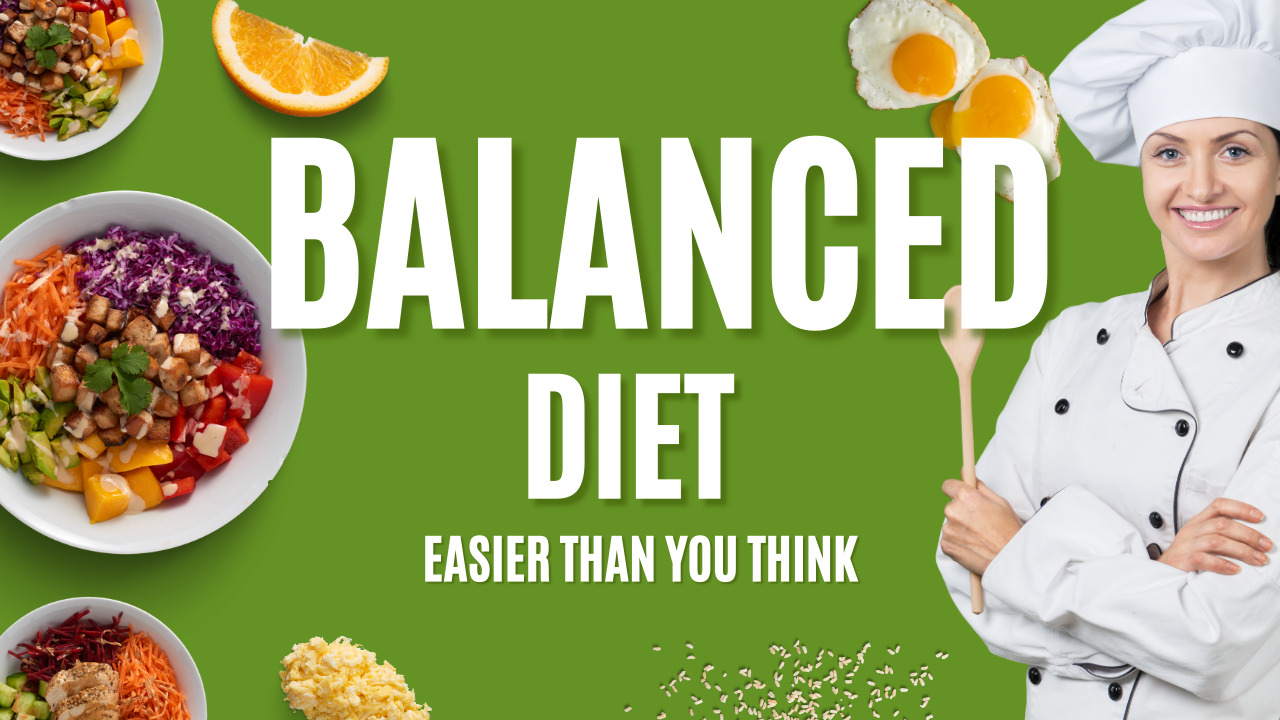A balanced diet is an important aspect of overall health and well-being, providing the body with the nutrients it needs to function correctly. But with so many different dietary approaches and recommendations out there, it can take a lot of work to know exactly what a balanced diet looks like.
At its most basic, a balanced diet includes a variety of different foods in the right proportions, ensuring that the body receives all the nutrients it needs to thrive. This includes carbohydrates, proteins, fats, vitamins, and minerals.
 One way to ensure that you are consuming a balanced diet is to follow the principles of a healthy eating plate. This model, developed by nutrition experts at Harvard University, recommends filling half of your plate with non-starchy vegetables, such as leafy greens, peppers, and tomatoes. A quarter of your plate should be filled with grains, such as whole wheat, rice, or quinoa, while the remaining quarter should be filled with a protein source, such as chicken, fish, or tofu.
One way to ensure that you are consuming a balanced diet is to follow the principles of a healthy eating plate. This model, developed by nutrition experts at Harvard University, recommends filling half of your plate with non-starchy vegetables, such as leafy greens, peppers, and tomatoes. A quarter of your plate should be filled with grains, such as whole wheat, rice, or quinoa, while the remaining quarter should be filled with a protein source, such as chicken, fish, or tofu.
In addition to following the healthy eating plate model, there are a few other key principles to consider when it comes to achieving a balanced diet:
- Eat a variety of different foods: To ensure that you are getting all the nutrients your body needs, it is essential to incorporate a wide range of foods into your diet. This might include various fruits, vegetables, grains, and proteins.
- Choose whole, unprocessed foods: Whenever possible, try to choose whole, unprocessed foods over more refined options. Whole foods are typically more nutrient-dense and provide the body with a wider range of vitamins and minerals.
- Limit added sugars and unhealthy fats: To support overall health, it is important to limit your intake of added sugars and unhealthy fats, such as trans fats and saturated fats. These types of nutrients can contribute to a range of health problems, including weight gain, high blood pressure, and elevated cholesterol levels.
- Don’t skip meals: While it may be tempting to skip meals in an effort to cut calories, this can actually have the opposite effect, as it can lead to overeating later on. Instead, aim to eat regular, balanced meals throughout the day to keep your energy levels stable.
- Pay attention to portion sizes: In addition to choosing the right types of foods, it is also important to pay attention to portion sizes. Overeating can lead to weight gain and other health problems, even if you are eating healthy foods.
- Stay hydrated: Drinking plenty of water is an important part of maintaining a balanced diet. Aim to consume at least 8-8 ounces of water per day, and more if you are physically active or live in a hot climate.
- Consider supplements: While it is generally best to get your nutrients from food sources, in some cases, supplements can be helpful in filling any gaps in your diet. For example, if you are vegan or vegetarian, you may need to take a supplement to ensure you are getting enough protein, or if you have a specific health condition, your healthcare provider may recommend a specific supplement.
Overall, a balanced diet is one that provides the body with all the nutrients it needs to function properly, while also taking into account individual needs and preferences. By following the principles of a healthy eating plate, choosing whole, unprocessed foods, and paying attention to portion sizes, you can help to ensure that you are consuming a balanced diet that supports your overall health and well-being.
 Are you experiencing digestive issues or struggling with gut health?Science has taught us space has five dimensions – length, width, height, past, and future. The five dimensions of space are the framework in physics and mathematics that define the properties of the universe. A solution that can address all five dimensions can create a comprehensive solution to your wellness.
Are you experiencing digestive issues or struggling with gut health?Science has taught us space has five dimensions – length, width, height, past, and future. The five dimensions of space are the framework in physics and mathematics that define the properties of the universe. A solution that can address all five dimensions can create a comprehensive solution to your wellness.
I’ve created the five-dimensional solution. I’ve trained in food, supplements, and Western science and help you create your physical framework for wellness. Yet, without your past and future, you are missing how you got here and where you are going.
My extensive training in Chinese Herbal Medicine delivers a holistic method to address and repair your past. I marry all this information with the lost art of eating to heal and Chinese Nutritional Therapy to show you how to create your future. Ready to learn more? Check it out here: Gut Health!

